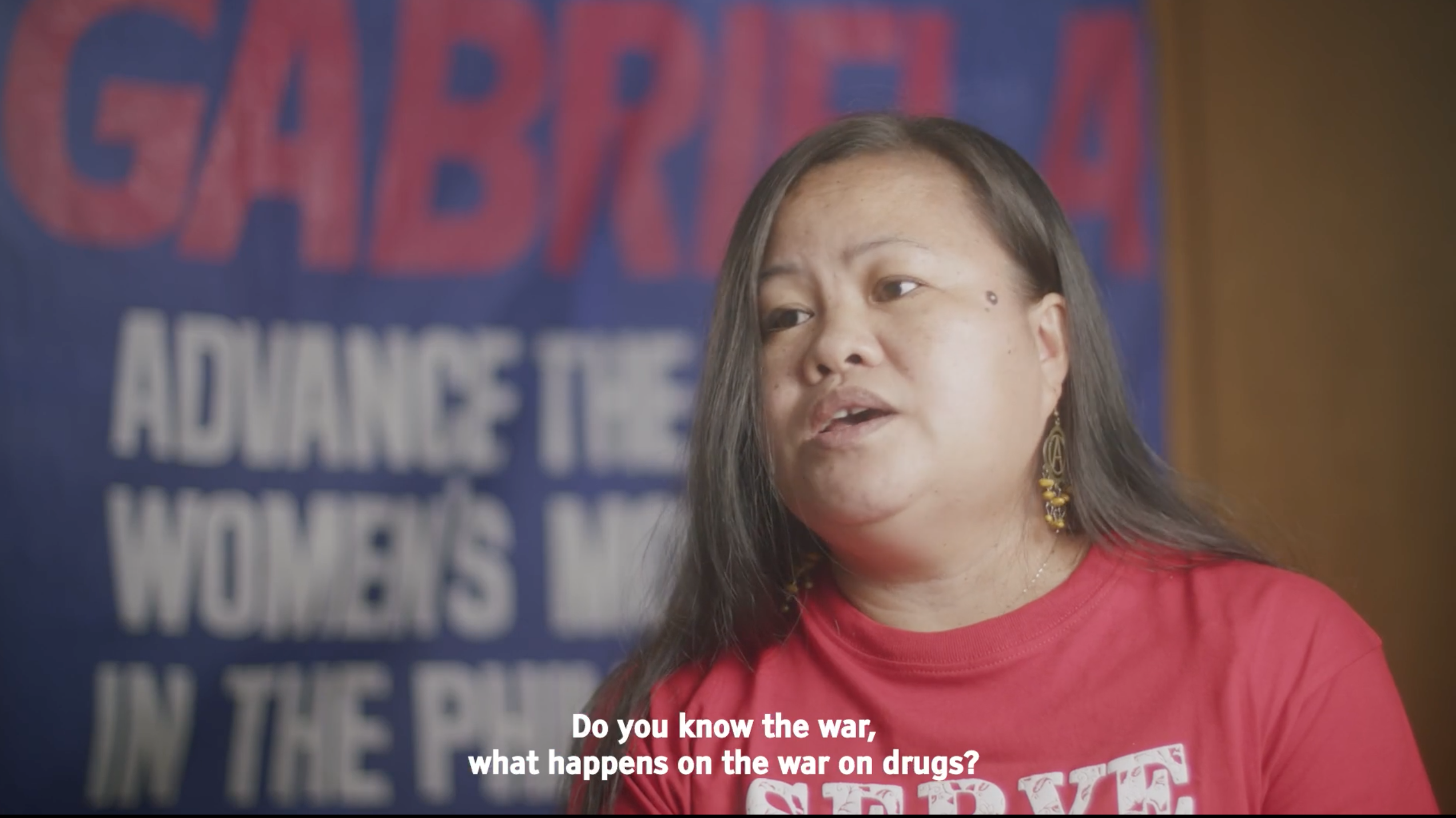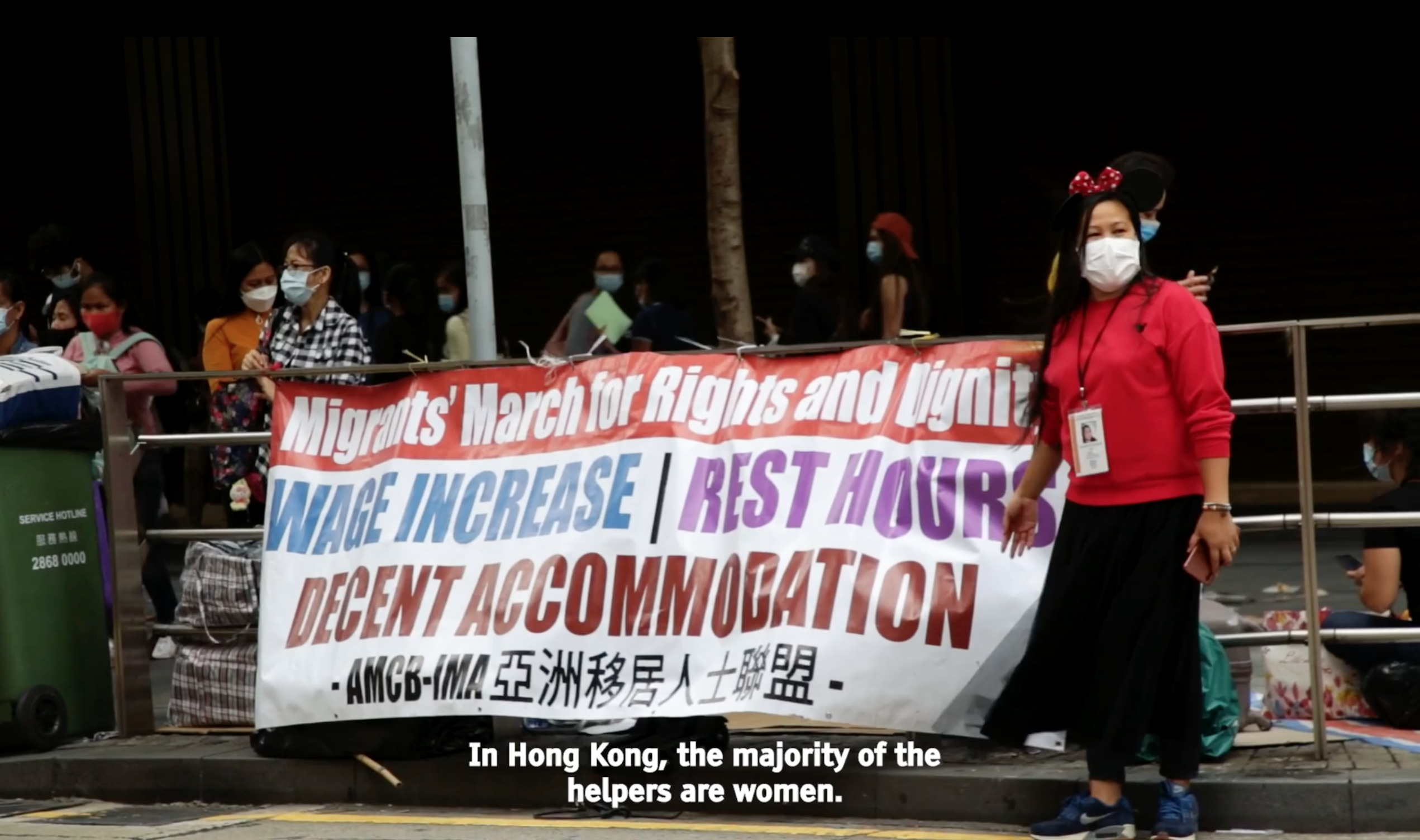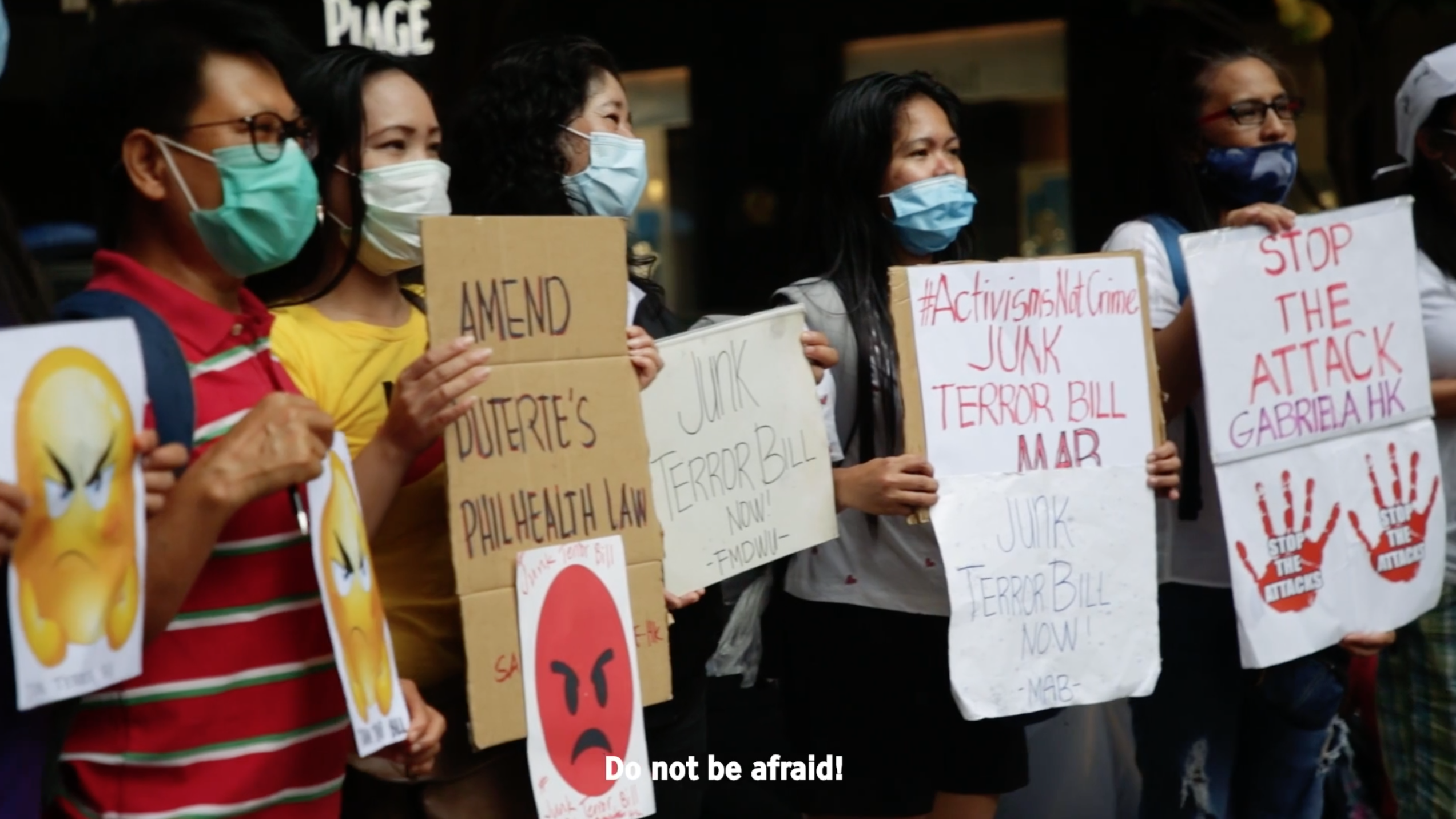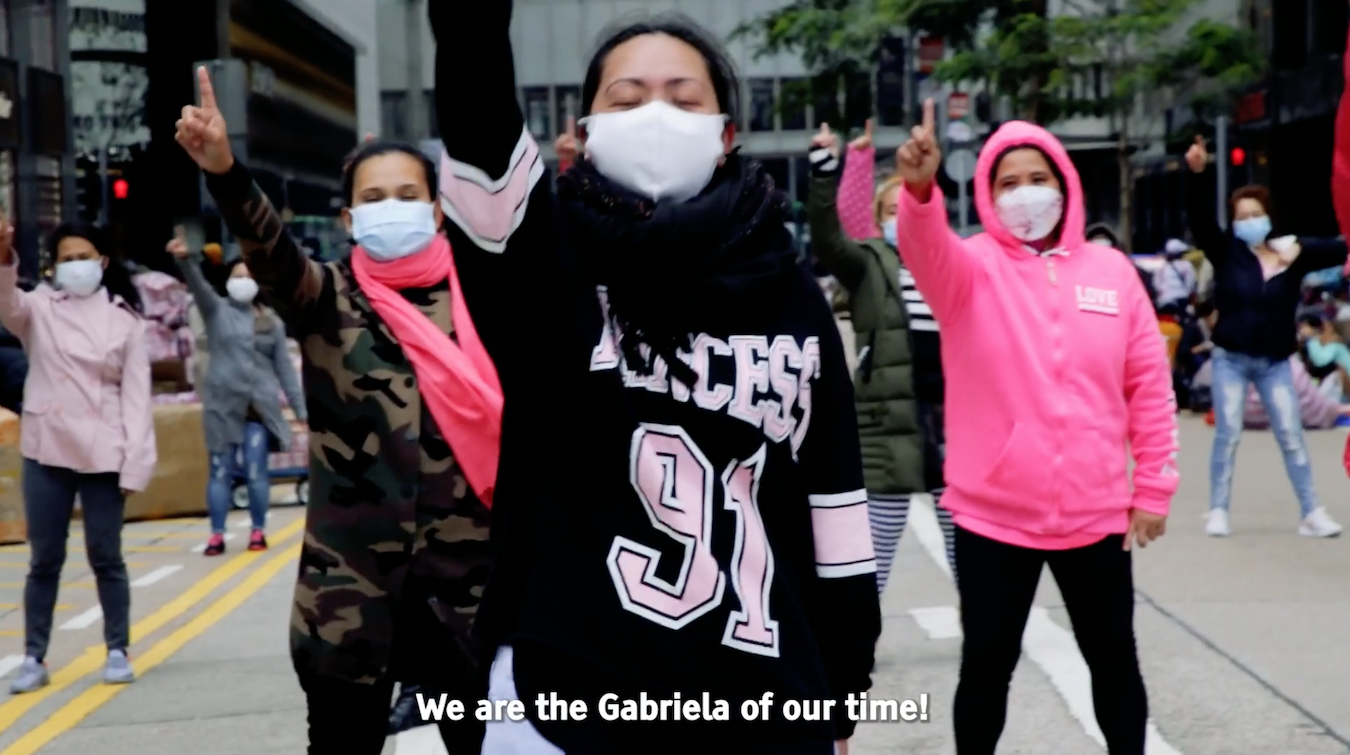by Brian Hioe
語言:
English
Photo Credit: Film Still
Brian Hioe spoke to Ani Hao, who DJs as Ani Phoebe, and is a writer, feminist media strategist, as well as one of the founders of Bad Times Disco and New Wave, about Bad Times Disco’s upcoming mutual aid fundraiser for migrant workers this Friday, December 16th at 7 PM in Hong Kong.
The event will take place at Music Room, Terrible Baby, 4th Floor, Eaton HK, Jordan, featuring a screening the documentary “Migrant Women Rise: Stories of Red-Tagged Overseas Filipino Workers”. This will be followed by a discussion with filmmaker Carl Catedral and migrant leaders, and then an after-party featuring DJs from Bad Times Disco.
Brian Hioe: This is Bad Times Disco’s fourth fundraiser. Firstly, could you talk a bit about what Bad Times Disco sees as its mission regarding social change? What were the previous fundraisers about and what is special about the fundraiser this time around? What will the funds be donated for?
Ani Hao: This is our fourth fundraiser and we specifically frame them as ‘mutual aid’ as well. Mutual aid means unconditional support for each other and unconditional redistribution of resources–it rejects the hierarchy and the logic of charity. Mutual aid means that our future and welfare are tied up together, we are all equals and interdependent and we need everybody to be well and healthy and cared for.
Migrant Women Rise (Trailer) from Carl Catedral on Vimeo.
When I started Bad Times Disco, I was very aware that it was during the COVID-19 pandemic, and I also thought about all of my favorite music labels and parties that have consciously campaigned and rallied for progressive change during very turbulent political times – it seems no different today, perhaps just aggravated and accelerated during late stage capitalism. So Bad Times Disco is as committed to a different system and a better world as we can be under late-stage capitalism and as being a record store–throwing these mutual aid fundraisers have been a great way to raise awareness of different issues and emergencies during COVID-19, and also raise awareness in general of mutual aid, which is pretty radical for hierarchical and charity-obsessed classist Hong Kong, but I hope that we can actually be a part of campaigns in the future. There’s a difference between being explicitly community-oriented, which we are, and then actually creating and supporting campaigns, which you might say is my day job. So I’m hoping to bring Bad Times Disco into that very small corner of the music industry which is actively campaigning and tackling some of the biggest issues of our times. You’ll see a lot more music collectives do something around environmental injustice, but I’m personally more interested in situating Bad Times Disco in the anti-fascist, anti-capitalist, worker-led campaigns. It would be so great if we could also get involved in unionizing music workers!
The previous fundraisers were all rather related to COVID-19 and various emergencies. We raised money for grassroots collectives across India really suffering from the second wave of COVID-19 – it was such a tragic irony that India was providing all of the world’s vaccines and that the government didn’t vaccinate its own citizens and residents. We also raised money for different migrant domestic worker activist collectives in Hong Kong, such as ATIS, Mission for Migrant Workers, and also a youth-led grassroots climate justice collective in the Philippines called Kids for Kids PH – they were raising money to support Typhoon Odette survivors. So you can say that the issues have all been rather urgent, but we are supporting community-based, self-led groups, so it means that all the people closest to these issues and most affected by these issues are deciding how to spend and distribute those resources. This time, we’re raising money for GABRIELA HK, they’re the Hong Kong chapter of GABRIELA, which is an international progressive alliance of Filipino women’s organizations. They’re pretty feminist and intersectional–I love how they “aspire to a sovereign society free from foreign domination and intervention with a self-reliant economy geared towards the people’s needs and gives equal value to the role of women in production…a socio-cultural system that is devoid of patriarchal values, gender oppression, discrimination, and violence.”

Film still
Me personally, I’ve been inspired by the legacy of GABRIELA–I actually know them more from the US context, where I’ve interviewed members of AF3RM, a transnational feminist anti-imperalist organization, which was previously an organization inspired by GABRIELA and very much in solidarity with the Philippine movement. And my background is more in feminist organizing, focusing on grassroots feminist movements, so GABRIELA is much closer to an organization that I was likely to be close to and interview; I think it makes so much sense that we are partnering with them for this mutual aid fundraiser.
BH: Could you tell us a bit about the film that is being screened this time? How does the film dovetail between contemporary struggles in Hong Kong among migrant workers and the political events of the past few years in the Philippines?
AH: Carl Catedral, the filmmaker of Migrant Women Rise, is actually my friend, and I’ve accompanied this film since before it had a name. I remember just talking through different reactions to shots and clips that Carl was showing me at the time. So I’m enormously proud to see the result, which I might also think has a little tiny imprint that I’ve personally made. But I remember telling Carl at the time that we really needed to connect the micro to the macro, and to follow personal stories and narratives in order to get attached to the big-picture politics. I think he’s done that really well with the two people that he’s chosen as protagonists for the documentary – Ate Dolo (United Filipinos in HK) and Ate Annabelle (GABRIELA HK). So the film actually dovetails more between their personal day-to-day lives and the giant mega political systems that they are both inserted in, in both Hong Kong and the Philippines. You really begin to understand how the personal is political, because you see how they are being persecuted by the Filipino government, and how much they miss their family and friends.
I think the other component that I was really intrigued by early on, and that I think is super strong in the film and absolutely missing in almost all journalist coverage of the domestic workers in Hong Kong is that Carl also focuses on the antagonism and conflicts between the Filipina domestic workers themselves. He shows how the progressive activists are campaigning for all of these human rights issues, and talking about the historical revisionism and killings of human rights activists in the Philippines, and then all of these other women are completely aggressive and heckling the activists and even telling them that [these people] should die. You really see firsthand the impact of so much misinformation and historical anesthesia and state propaganda. It reminded me a lot of what I’ve witnessed in Brazil these past four years, where I used to live before I came to Hong Kong.

Film still
BH: The fundraiser takes place after a period in which COVID-19 had a significant impact on Hong Kong–strongly impacting migrant workers at a time in which Hong Kong had the world’s highest death rate from COVID-19. Do you see this as pointing towards the need for mutual aid in Hong Kong at this juncture?
AH: Absolutely. There is so much need for mutual aid in Hong Kong in general. Hong Kong is really unequal and classist, and just a truly expensive city where the government is in no apparent rush to provide affordable housing for its poorest. But the framing of poverty and how to address it in Hong Kong is just not structural at all–most organizations that I see and most people that I know would volunteer to cook meals for the unhoused and leave it at that.
At the height of the pandemic here, which was earlier this year, families actually began to kick out their domestic workers, whether they were infected or not. There was a huge need to not only address the stigma that Hong Kongers had towards domestic workers (they seemed to think that they were infected while they themselves weren’t, for some strange reason), but also the unlawfulness and basic inhumanity of this kind of treatment. I actually began to see more international and local press and coverage of these issues, which maybe was something positive out of all that. We held a third mutual aid fundraiser then, raising money for Asian Migrants’ Coordinating Body (AMCB) and Bethune House, a shelter for migrant domestic workers.

Film still
And we’re still continuing to raise money for migrant domestic worker-led collectives, obviously, but there’s a lot of need for more mutual aid and campaigning in Hong Kong. Maybe we can get involved in raising money for a strike fund or for a campaign pressuring the government to finally provide affordable housing in the future, these are all issues I think are super important here. At the same time, I completely acknowledge the current political difficulty of campaigning here–it’s not going to be democratic or masses on the street. But maybe we can do our part in some small way.
BH: What is planned for the music program for the fundraiser? Any specific points you’d like to highlight?
AH: So after the film, we’ll have a Q&A with Carl Catedral, Dolores Balladares Pelaez (United Filipinos in HK), and hopefully, Annabelle Maregman from GABRIELA HK, moderated by myself. And then I’ll be the DJ for the night afterward–talk about doing three different things nearly all at once. So Bad Times Disco parties are always 100% all-vinyl, it’s just something that we stick to because we’re also a pop-up record store and because me and the co-founder, Yuki, love records. And it’s great to insist on only playing records in this digital age–it makes me work harder. So I’ll be DJing for three hours, doing a nice little afterparty, and I hope that everyone can really come together and celebrate. It’s International Migrants Day that weekend, and we have a lot to celebrate too – just being together, learning together, and practicing international solidarity. And letting down our hair and dancing. I think that’s what Bad Times Disco is all about. It’s not this “music is unity” color-blind kumbaya thing–it’s this very explicitly political, we are trying to create the progressive change in this world but it’s exhausting, and so music is here to rejuvenate and to bring us together in celebrating the process, not just the results.



